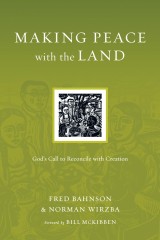Details

Making Peace with the Land
God's Call to Reconcile with CreationResources for Reconciliation
|
CHF 18.05 |
|
| Verlag: | IVP Academic |
| Format: | EPUB |
| Veröffentl.: | 03.08.2012 |
| ISBN/EAN: | 9780830866762 |
| Sprache: | englisch |
| Anzahl Seiten: | 182 |
Dieses eBook enthält ein Wasserzeichen.
Beschreibungen
God is reconciling all things in heaven and on earth.We are alienated not only from one another, but also from the land that sustains us. Our ecosystems are increasingly damaged, and human bodies are likewise degraded. Most of us have little understanding of how our energy is derived or our food is produced, and many of our current industrialized practices are both unhealthy for our bodies and unsustainable for the planet.Agriculturalist Fred Bahnson and theologian Norman Wirzba declare that in Christ, God reconciles all bodies into a peaceful, life-promoting relationship with one another. Because human beings are incarnated in material, bodily existence, we are necessarily interdependent with plants and animals, land and sea, heaven and earth. The good news is that redemption is cosmic, with implications for agriculture and ecology, from farm to dinner table.Bahnson and Wirzba describe communities that model cooperative practices of relational life, with local food production, eucharistic eating and delight in God's provision.Reconciling with the land is a rich framework for a new way of life. Read this book to start down the path to restoring shalom and experiencing Jesus' kingdom of shared abundance, where neighbors are fed and all receive enough.
<p>Series Preface<br />
Foreword by Bill McKibben<br />
Prologue: For God So Loved the Soil . . . <br />
1. Reconciliation with the Land<br />
2. Learning to See<br />
3. Reconciliation Through Christ<br />
4. Field, Table, Communion: The Abundant Kingdom Versus the Abundant Mirage<br />
5. Reconciliation Through Eating<br />
6. Bread for the Whole Body of Christ<br />
Epilogue: . . . So We Can Eat from the Tree of Life<br />
Acknowledgments<br />
Recommendations for Further Reading<br />
Study Guide<br />
Notes<br />
About the Duke Divinity School Center for Reconciliation<br />
About Resources for Reconciliation</p>
Foreword by Bill McKibben<br />
Prologue: For God So Loved the Soil . . . <br />
1. Reconciliation with the Land<br />
2. Learning to See<br />
3. Reconciliation Through Christ<br />
4. Field, Table, Communion: The Abundant Kingdom Versus the Abundant Mirage<br />
5. Reconciliation Through Eating<br />
6. Bread for the Whole Body of Christ<br />
Epilogue: . . . So We Can Eat from the Tree of Life<br />
Acknowledgments<br />
Recommendations for Further Reading<br />
Study Guide<br />
Notes<br />
About the Duke Divinity School Center for Reconciliation<br />
About Resources for Reconciliation</p>
McKibben is a former staff writer for The New Yorker and a frequent contributor to The New York Review of Books. His books include The End of Nature (Random House), The Age of Missing Information (Random House), The Comforting Whirlwind (Eerdmans) and, most recently, Hope, Human and Wild: True Stories of Living Lightly on the Earth (Little, Brown).
Norman Wirzba (Ph.D., Loyola University Chicago) is research professor of theology, ecology and rural life at Duke Divinity School. He holds memberships in the American Academy of Religion, the Society for Continental Philosophy and Theology and the International Association for Environmental Philosophy. Wirzba is the author of Food and Faith (Cambridge), Living the Sabbath (Cambridge) and The Paradise of God (Oxford) as well as numerous reviews and articles, including "Agrarianism After Modernity: An Opening for Grace" in After Modernity? Secularity, Globalization, and the Re-Enchantment of the World (Baylor).
Fred Bahnson is a permaculture gardener, a pioneer in church-supported agriculture, and an award-winning poet and essayist. Bahnson is the director of the Food and Faith initiative at the Wake Forest University School of Divinity. Formerly, he was a Kellogg Food Society policy fellow at the Institute for Agriculture and Trade Policy and the cofounder and former director of Anathoth Community Garden in Cedar Grove, North Carolina. Bahnson is a contributor to the University Press of Kentucky book Wendell Berry and Religion edited by Joel Shuman and the author of the forthcoming Free Press book Soil and Sacrament: Four Seasons Among the Keepers of the Earth. His essay "Climbing the Sphinx" was featured in Best American Spiritual Writing 2007 edited by Philip Zaleski.
Norman Wirzba (Ph.D., Loyola University Chicago) is research professor of theology, ecology and rural life at Duke Divinity School. He holds memberships in the American Academy of Religion, the Society for Continental Philosophy and Theology and the International Association for Environmental Philosophy. Wirzba is the author of Food and Faith (Cambridge), Living the Sabbath (Cambridge) and The Paradise of God (Oxford) as well as numerous reviews and articles, including "Agrarianism After Modernity: An Opening for Grace" in After Modernity? Secularity, Globalization, and the Re-Enchantment of the World (Baylor).
Fred Bahnson is a permaculture gardener, a pioneer in church-supported agriculture, and an award-winning poet and essayist. Bahnson is the director of the Food and Faith initiative at the Wake Forest University School of Divinity. Formerly, he was a Kellogg Food Society policy fellow at the Institute for Agriculture and Trade Policy and the cofounder and former director of Anathoth Community Garden in Cedar Grove, North Carolina. Bahnson is a contributor to the University Press of Kentucky book Wendell Berry and Religion edited by Joel Shuman and the author of the forthcoming Free Press book Soil and Sacrament: Four Seasons Among the Keepers of the Earth. His essay "Climbing the Sphinx" was featured in Best American Spiritual Writing 2007 edited by Philip Zaleski.
Diese Produkte könnten Sie auch interessieren:

La alternativa ecológica: Biblia, espiritualidad y compromiso social

von: Xabier Pikaza Ibarrondo

CHF 17.00

Die Komplementarität räumlicher und zeitlicher Aspekte in der Eschatologie des Hebräerbriefes

von: Elena Belenkaja

CHF 121.00














